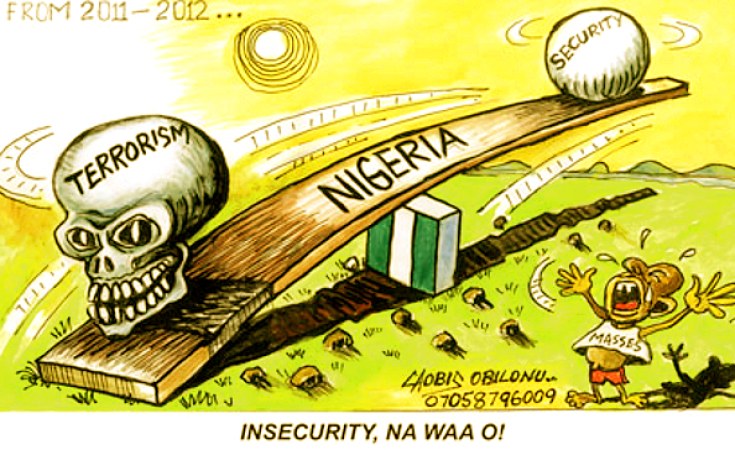By telling the world that he is fighting al-Qaeda, Jonathan is trying to paint his government - which has failed to combat Boko Haram - as an unlikely hero in a global war.
"Boko Haram is no longer a local terrorist group. It is operating clearly as an al-Qaeda operation. It is an al-Qaeda of West Africa."
These were the words uttered by Nigeria's President Goodluck Jonathan during a news conference held in the French capital of Paris on 17 May. The media briefing followed an earlier African security summit, coordinated and hosted by France, where the governments of Nigeria, Cameroon, Niger, Benin and Chad, pledged better regional cooperation in the fight against Boko Haram.
In turn, the French government and its UK, US and EU counterparts, committed to provide logistical and technical support to regional initiatives aimed at uprooting the Islamist militant group.
The 'Boko Haram plan of action' formulated at the summit was by no means earth-shattering or unprecedented. Speaking at a security conference in Abuja in February, France's President François Hollande similarly promised his country's support to Nigeria's armed campaign against Boko Haram.
"Your struggle is also our struggle," Hollande told delegates, adding "we will always stand ready not only to provide our political support but our help every time you need it because the struggle against terrorism is also the struggle for democracy."
During the same address, the French president also urged for greater regional cooperation between Nigeria and its neighbouring countries - many of which may already be experiencing contagion from the Boko Haram insurgency.
However, what was unique about the 17 May summit was that it marked one of the first occasions that the Nigerian government had explicitly associated Boko Haram with the transnational al-Qaeda network. In all fairness, such linkages are not necessarily without merit.
From reports suggesting that Boko Haram members trained or even fought alongside al-Qaeda's North African branch in Mali, to accounts that Boko Haram may have been supported by Osama Bin Laden himself, signs of potential links between the Nigerian militant group and al-Qaeda are plentiful. But such claims are hardly new to the Boko Haram discourse and, one would assume, would have been investigated by the Nigerian government upon first mention.
So why would Jonathan only now publicly label Boko Haram as an al-Qaeda offshoot? For one, by doing so, he may have potentially earned himself and his government a rather unlikely saviour.
An unlikely saviour
The Chibok kidnapping of over two hundred schoolgirls has drawn widespread attention to Boko Haram's near decade-long insurgency against the Nigerian government, an insurgency which has killed at least 2,000 people this year alone.
Moreover, the incident has also placed a rather harsh spotlight on the Jonathan administration and the role it has played in the ensuing carnage. In doing so, a tale of chronic governmental neglect in north-eastern Nigeria - Boko Haram's birthplace and primary area of operation - has come to the fore.
Prevailing narratives also present the story of an unprofessional and ill-disciplined military who have committed gross human rights abuses in combating the Islamist militants.
Extortion, extrajudicial killings of civilians and the abduction and assault of suspected Boko Haram members' wives and children have seemingly become part and parcel of the army's counterinsurgency strategy.
In this regard, the army has not only failed to win the trust of local communities, essential to the success of any counterinsurgency campaign, but may have unknowingly aided Boko Haram in its recruitment.
Then there are also those accounts which claim that the Islamist insurgency is being used as a pawn in a game of political chess - a perpetual and often ruthless game played between Nigeria's opposing southern and northern political blocs. A game which has all too often resulted in significant collateral damage.
However, by designating Boko Haram as being little more than an al-Qaeda proxy, President Jonathan has tried to pretty much absolve his beleaguered government of its role in the spiralling conflict.
He will be hoping that issues of poor governance, systemic bureaucratic corruption and an ill-disciplined military - all of which should be central to discourses about Boko Haram - will now be concealed in the shadow cast by the global (and non-Nigerian) bogeyman.
And he will be hoping that Boko Haram's actions in the past, present and foreseeable future, will be seen as being no more than a symptom of al-Qaeda's global war against the West - a war which the militaries of global superpowers such as the US, UK and France themselves are struggling to contain.
By telling the world that he is fighting al-Qaeda - a global as opposed to a Nigerian enemy - Jonathan may not only be attempting to save face.
He may also be attempting to convince an ever-critical domestic and international audience that his government is actually an unlikely hero in a war which to date has only known victims and villains.
Ryan Cummings is Chief Analyst for Africa for red24, a crisis management assistance company providing advice, support and response within crisis management, travel tracking, product recall, kidnap and ransom and travel security. Follow red24 on twitter @red24security. Follow Ryan @Pol_Sec_Analyst


